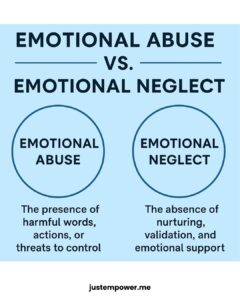Some of the deepest wounds we carry aren’t the result of what happened to us, but what didn’t. Childhood emotional neglect is one of the most misunderstood and overlooked forms of trauma. It often flies under the radar, even in well-meaning families, yet it can shape nearly every aspect of our adult lives.
If you’ve ever asked yourself, “Why do I feel so disconnected from my emotions? Why do I struggle to express my needs or feel like something’s missing—even if my childhood seemed fine on the surface?” — childhood emotional neglect may be part of your story.

What Is Childhood Emotional Neglect?
Childhood emotional neglect (CEN) refers to a pattern in which a child’s emotional needs are routinely ignored, dismissed, or overlooked by caregivers. It isn’t about abuse or intentional harm. In fact, emotional neglect can happen even in homes that are outwardly stable or loving.
So what is emotional neglect, exactly? It’s the absence of emotional attunement and responsiveness. Children rely on their parents to help them understand, express, and regulate their emotions. When those needs go unmet, children learn to suppress their feelings, question their worth, and adapt by disconnecting from their emotional world.
Emotional Neglect vs. Emotional Abuse
It’s easy to confuse emotional neglect with emotional abuse, but they’re different. Emotional abuse is active – hurtful words, manipulation, shaming. Emotional neglect, on the other hand, is passive. It’s what wasn’t said. What wasn’t done.
Emotional abuse is the presence of harmful interactions. Emotional neglect is the absence of helpful ones.
Because there’s often no clear “event” to remember, many adults struggle to identify CEN in their past.

How Does Childhood Emotional Neglect Happen?
Parental emotional neglect is rarely malicious. It often stems from:
- Parents who are emotionally immature or overwhelmed
- Unresolved trauma passed down generationally
- Cultural or societal norms that discourage emotional expression
- Mental health issues or substance use
- A lack of awareness about child development and emotional needs
Signs of Childhood Emotional Neglect in Adulthood
You may have experienced emotional neglect in childhood if you:
- Feel numb or disconnected from your emotions
- Struggle to identify or express how you feel
- Constantly feel like a burden or “too much”
- Are highly independent and uncomfortable relying on others
- Struggle with boundaries or people-pleasing
- Feel a chronic sense that something is missing
- Have low self-esteem or a harsh inner critic
- Avoid vulnerability or emotionally unavailable relationships
If you’re asking, “How do you tell if you were emotionally neglected as a child?” — these signs are a good place to start.
Childhood Emotional Neglect in Adulthood
Unchecked, emotional neglect in childhood can lead to:
- Difficulty forming healthy, secure relationships
- Anxiety or depressive symptoms
- A disconnection from one’s sense of self or purpose
- Emotional dysregulation or dissociation
- Avoidance of difficult emotions or conflict
It can also impact parenting. Many adults who were emotionally neglected struggle to respond differently with their own children, perpetuating the cycle unintentionally.
How to Break the Cycle of Emotional Neglect
Healing is absolutely possible. Here are a few foundational steps to begin your journey:
- Acknowledge that it happened. Emotional neglect is real, even if it’s hard to name.
- Give yourself permission to feel. Reconnecting with your emotions can feel uncomfortable at first, but it’s a necessary part of healing.
- Identify unmet emotional needs. Ask yourself: what did I need as a child that I didn’t receive?
- Learn new skills. Emotional literacy, boundary-setting, and self-compassion are skills that can be learned and practiced.
- Work with a therapist. Ideally one who is trained in childhood emotional neglect or relational trauma.
Does Therapy Help With Trauma from Emotional Neglect?
Absolutely. A therapist can help you:
- Reconnect with emotions you had to suppress
- Develop a more compassionate inner voice
- Build secure attachment and healthy relationships
- Process grief for what you didn’t receive
- Break patterns of emotional disconnection
Many people find that naming and exploring CEN in therapy is life-changing. It explains so much of what they’ve felt but never had words for.
Emotional neglect is often quiet and invisible. But its impact can echo loudly into adulthood. If you’re struggling with the effects of CEN, know this: it’s not your fault. And you are not alone.
With the right support and tools, healing is not only possible—it’s transformative.
